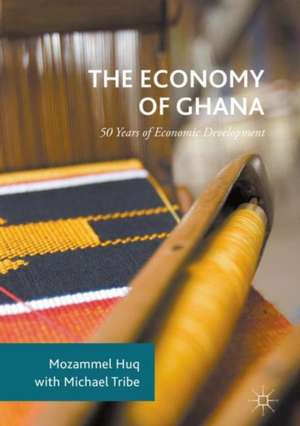The Economy of Ghana: 50 Years of Economic Development
Autor Mozammel Huq, Michael Tribeen Limba Engleză Hardback – 6 oct 2018
Preț: 1022.34 lei
Preț vechi: 1246.76 lei
-18% Nou
Puncte Express: 1534
Preț estimativ în valută:
195.69€ • 212.63$ • 164.48£
195.69€ • 212.63$ • 164.48£
Carte tipărită la comandă
Livrare economică 21 aprilie-05 mai
Preluare comenzi: 021 569.72.76
Specificații
ISBN-13: 9781137602428
ISBN-10: 1137602422
Pagini: 513
Ilustrații: XXXVIII, 542 p. 7 illus., 5 illus. in color.
Dimensiuni: 148 x 210 x 40 mm
Greutate: 1.09 kg
Ediția:2018
Editura: Palgrave Macmillan UK
Colecția Palgrave Macmillan
Locul publicării:London, United Kingdom
ISBN-10: 1137602422
Pagini: 513
Ilustrații: XXXVIII, 542 p. 7 illus., 5 illus. in color.
Dimensiuni: 148 x 210 x 40 mm
Greutate: 1.09 kg
Ediția:2018
Editura: Palgrave Macmillan UK
Colecția Palgrave Macmillan
Locul publicării:London, United Kingdom
Cuprins
Part I. Overview.- Chapter 1. A General Overview.- Chapter 2. Policies and Reforms: An Historical Overview.- Part II. The Wider Macroeconomy.- Chapter 3. Growth and Structure of the Economy.- Chapter 4. Achieving Macroeconomic Stability.- Part III. Sectoral Developments.- Chapter 5. Agriculture.- Chapter 6. Cocoa.- Chapter 7. Industry: A Broad Overview.- Chapter 8. Mining.- Chapter 9. Manufacturing.- Chapter 10. The Services Sector.- Part IV. Money and Banking, External Trade and Financial Flows.- Chapter 11. Banking and Finance.- Chapter 12. International Trade.- Chapter 13. External Financial Flows and Debt Relief.- Part V. Infrastructure, Environment and Governance.- Chapter 14. Transport and Communications.- Chapter 15. Energy and Water.- Chapter 16. Education and Health.- Chapter 17. The Environment.- Chapter 18. Governance.- Part VI. Poverty and Income Distribution.- Chapter 19. Poverty and Inequality.- Chapter 20. The State Role in Welfare.- Part VII. Looking Ahead.- Chapter 21.The Way Forward.
Notă biografică
Mozammel Huq is Honorary Senior Lecturer at the University of Strathclyde, UK, and Visiting Professor of Economics at UttarBangla University College (National University Bangladesh), Bangladesh. He has taught development economics for over three decades and published a large number of articles and books, including Development Economics (2009, with A Clunies-Ross and D Forsyth). His association with Ghana has remained close especially since the two-year period (1982-84) that he spent as a Senior Research Fellow at Cape Coast University.
Michael Tribe is Honorary Lecturer at the University of Strathclyde, UK. He is a development economist with wide-ranging academic experience and a significant publication record. He previously taught at the University of Bradford, UK, was a Research Fellow in the University of Cape Coast, Ghana between mid-1982 and mid-1984, and was the UK coordinator for a Ghana Development Studies Academic Link between 1990 and 2011.
Michael Tribe is Honorary Lecturer at the University of Strathclyde, UK. He is a development economist with wide-ranging academic experience and a significant publication record. He previously taught at the University of Bradford, UK, was a Research Fellow in the University of Cape Coast, Ghana between mid-1982 and mid-1984, and was the UK coordinator for a Ghana Development Studies Academic Link between 1990 and 2011.
Textul de pe ultima copertă
The book follows a first edition published in 1989, which focused on the severe economic crisis Ghana faced during the late 1970s and the early 1980s. In this second edition, the authors extend the review up to the mid-2010s, covering the entire period since independence, with a special focus on shifts in economic policy, starting with the adoption of the Economic Recovery Programme in 1983. Huq and Tribe provide systematic coverage of Ghanaian economic development since its independence, reviewing the two main modes of development that have been practiced; and offer an updated, rich data bank. By analyzing the wider macroeconomy of Ghana; its individual sectors; money, banking and trade; infrastructure and environmental policies; and Ghana’s poverty, welfare and income distribution, the authors are able to draw vital lessons from the country’s economic development.
Caracteristici
Coherent and sequential coverage, providing a reader with a consistent and thorough analysis of the Ghanaian economic development covering more than half a century Offer readers deep insights into the two main modes of development that have been practised in Ghana – the initial phase of resource allocation which was largely determined by the government (i.e. the so called administered allocation) versus the current phase in which the neo-liberal agenda featuring a free market model of development is being promoted Uses an updated data bank, systematically presented covering the period from Ghana's independence in 1957 to the mid-2010s
